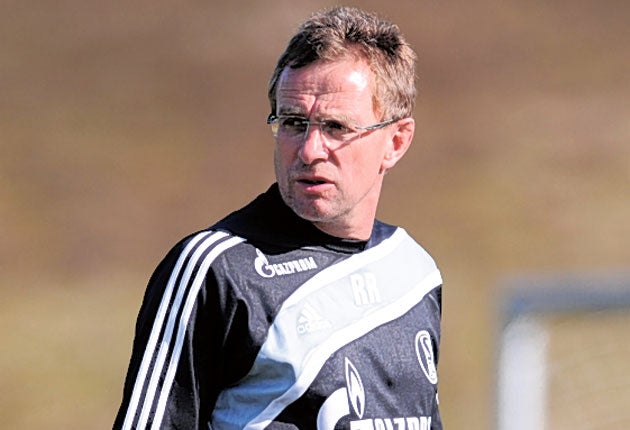Returning Rangnick's plan of attack threatens Inter

Adrift in 11th place in the Bundesliga, Schalke 04 might be the weakest remaining side in the Champions League. But, since the return of Ralf Rangnick last month, they might have the most interesting coach. Rangnick is one of Europe's most imaginative tacticians, with as pure a commitment to attacking football as anyone east of Pep Guardiola.
While Barcelona's successes are based on a culture with decades-old roots, Rangnick's are all the more impressive for the speed of their invention. Earlier in a long coaching career, Rangnick achieved promotions at Ulm 1846 and Hannover 96. He took Schalke, whom he joined in 2004, to a second-place finish and a German cup final before his dismissal.
It was in his next job, at Hoffenheim, where Rangnick impressed the most. He joined the club when they were in the third tier of German football, but bankrolled by the billionaire Dietmar Hopp. Rangnick dragged them to consecutive promotions and a spell at the top of the Bundesliga in their first season there. Despite the investment, this was no vulgar galactico experiment from Rangnick, but the bold execution of an understanding of the game.
Rangnick is from the tradition of coaches who never played the game to a high level; he even played briefly for Southwick FC, in Sussex. As such, his conception of the game is more learnt than instinctive. Arrigo Sacchi, whose playing achievements were just as modest as Rangnick's, famously said of this that "I never realised that in order to become a jockey you have to have been a horse first". Appropriately enough, Sacchi was Rangnick's model and the German used to spend every available minute poring over videos of the great Milan sides for analysis, in the hope of adapting their pressing and movement for his own teams.
But comparisons are as easily made between Rangnick and Arsène Wenger, not just because of the glasses and "Professor" nickname, nor because his home province of Baden-Wurttemberg borders Wenger's Alsace, but because of a common commitment to attacking, ambitious football and a shared belief in the power of young players to achieve it. At Hoffenheim Rangnick played a bold 4-3-3, with emphasis on tempo, possession and pressing from the front, enacted by young players. After his first season, the oldest player Rangnick brought to Hoffenheim was 24-year-old Per Nilsson – the rest were all between 19 and 21. But the momentum could not be sustained and Rangnick resigned in January in protest at the sale of Luiz Gustavo to Bayern Munich.
Now back in Gelsenkirchen, he faces the holders, Internazionale, a side who have fought for the Serie A title since the arrival of Leonardo last December. The Brazilian coach denied that their superiority to Schalke made them favourites. "Schalke are in the quarter-finals and even if they're not doing great in the league," he said, "we all know they will have bundles of enthusiasm and it won't be easy playing them." Diego Milito, the hero of last year's final, is likely to return up front for Inter.
Subscribe to Independent Premium to bookmark this article
Want to bookmark your favourite articles and stories to read or reference later? Start your Independent Premium subscription today.

Join our commenting forum
Join thought-provoking conversations, follow other Independent readers and see their replies